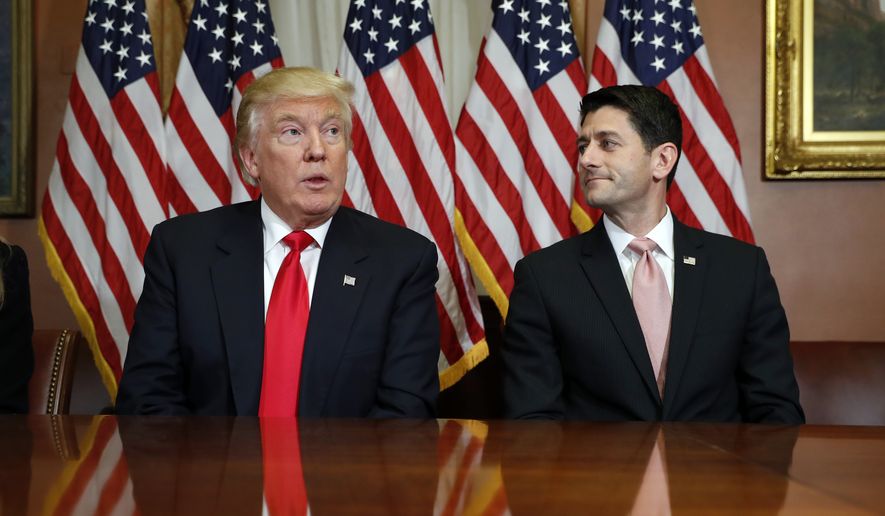Republicans’ first hardball move of the new Congress fizzled Tuesday as lawmakers were forced to drop their attempt to weaken the House’s independent ethics watchdog, bowing to widespread criticism including from President-elect Donald Trump, who told them they had more important things to work on.
Within a span of 15 hours, the House GOP held a secret vote to bring the Office of Congressional Ethics under control of the lawmakers themselves, then reversed that just minutes before the chamber convened.
Democrats complained that the rules adopted Tuesday were still unfair, even with GOP concession on ethics, because lawmakers will be punished for live-streaming from the floor — a long-standing violation, but one that will now earn members a fine.
The GOP powered the new rules through on a 234-193 vote.
The package helps pave the way for repeal of Obamacare and for cutting federal employees’ salaries, but the ethics dust-up spoiled the GOP’s ebullient kickoff to an era of power and partnership with Mr. Trump, who’d promised to “drain the swamp” by overturning the cozy back-scratching relationships that have fueled Washington for decades.
The debate among Republicans also revealed lingering divisions within the House GOP caucus, where members had disagreed about whether and how to go about changing the ethics process.
SEE ALSO: Trump blasts House GOP for ‘weakening’ ethics office
“I think all the bluster during the campaign now turns into legislative actions — or lack of — and I really think despite whatever the intentions are to carry out those commitments, it’s going to be very difficult,” said Rep. Raul Grijalva, Arizona Democrat. “I think this whole thing with the ethics just made the swamp a little murkier for everyone.”
The odd sequence began with a secret vote late Monday, in which GOP lawmakers decided to change the chamber’s rules and bring the independent ethics office under the control of the House Ethics Committee.
The office was established in 2008 after a congressional task force said an independent entity was needed to assist the House in enforcing its ethical standards.
But Republicans said the independent office had too much power and not enough protections for lawmakers and staff: It allowed anonymous complaints and made information on investigations public even when there was no final conclusion.
Mr. Trump, in a Twitter blast Tuesday morning, said the complaints may be valid — but he said reforming the office was a weak way for the GOP to kick off the new year.
“With all that Congress has to work on, do they really have to make the weakening of the Independent Ethics Watchdog, as unfair as it … may be, their number one act and priority. Focus on tax reform, healthcare and so many other things of far greater importance!” he said via Twitter.
A tide of conservative and liberal watchdog groups also blasted the move, and Democrats said it signaled a poor start for the new Congress and should serve as a warning to Republicans as they tackle the rest of their agenda.
“Republicans should remember the strength of public outrage they faced in the space of 12 hours as they scheme to do lasting damage to the health and economic security of millions and millions of hard-working families,” House Minority Leader Nancy Pelosi, California Democrat, said.
Some conservatives argued they hadn’t done anything wrong, saying the ethics watchdog has been more of an attack dog.
Rep. Steve King, Iowa Republican, said the office’s reliance on anonymous reports of alleged wrongdoing to drive investigations, deprives members of their constitutional right to confront their accusers. He accused the news media of mischaracterizing the GOP move and Mr. Trump’s tweet for allowing the news media to make the story about Republican infighting.
“I’m for abolishing the OCE entirely,” said the Iowa Republican, who voted for the rules change to remake the independent office. “It was set up by Nancy Pelosi. It wasn’t bipartisan from the beginning.”
Democrats, meanwhile, bristled over the rules change that established a fine for using smartphones to record or live-stream from the chamber.
They said the move was retaliation for last year’s sit-in, when Democrats occupied the chamber for 25 hours in June, demanding votes on gun control measures.
Some Democrats said the punishment may be an unconstitutional attack on members’ rights to speech and debate.
The debate over the ethics office could be the first of several areas where Mr. Trump finds more common cause with Democrats than with his own party — giving rise to the possibilities of strange new coalitions emerging on Capitol Hill.
Darrell West, director of governance studies at the Brookings Institution, said the dust-up served as a warning to House Republicans that Mr. Trump will not be a rubber stamp for their agenda.
“He has his own agenda and sometimes it is going to diverge from GOP plans. Republicans will have to keep this in mind for the future,” he said. “It is a time of odd alliances and unusual bed partners. That creates risks for both parties.”
• Stephen Dinan and S.A. Miller contributed to this report.
• Tom Howell Jr. can be reached at thowell@washingtontimes.com.




Please read our comment policy before commenting.